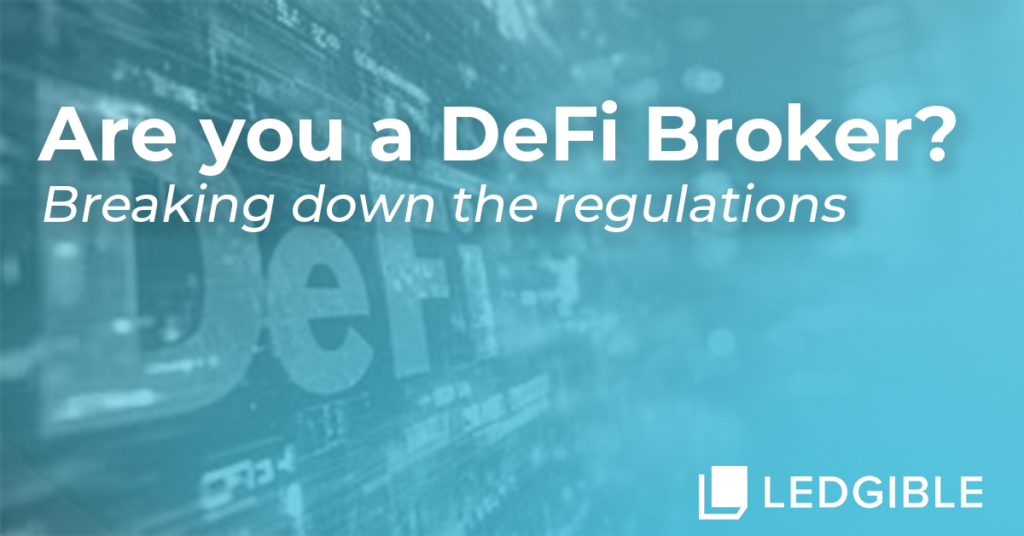There’s been a lot of news about the recent repeal the regulations commonly known as the (decentralized) DeFi regulations where DeFi brokers who are front end service providers working directly with users do not have to report trades through the 1099-DA.

This repeal is based on the December 27, 2024 published final regulations with regards to sales, exchanges, transfers, and payment processing involving digital assets through decentralized finance (“DeFi”) providers. (Ledgible summarized those findings)
At that time, the broad definition has been reduced to “trading front-end services” and apply to any provider in a trade or business of effecting sales/exchanges of digital assets who is generally not a principal or agent to the transaction.
However, centralized broker requirements have not been repealed and have been published into law. The US Treasury and IRS issued guidance based on that law in June of 2024. But taking a closer look at the original regulations, many who consider themselves a DeFi broker may actually fall into one of the older definitions.
When the IRS published the proposed digital asset tax reporting regulations in August 2023, the definition of broker captured providers in a trade or business of effecting sales/exchanges of digital assets on behalf of a “customer”. A customer was defined into four types generally consistent with the definition for sales/exchanges of traditional securities. This customer definition meant a person, other than the provider themselves, if the provider acts as:
- An agent for the sale (like a fiduciary type of intermediary)
- A principal for the sale (like a direct counterparty selling from their own inventory)
- A participant responsible for paying the customer or crediting their account (like a middleman such as a custodian or transfer agent)
- A digital asset middleman (like other participants that may bring buyers/sellers together)
- Certain payment processors, real estate transactions, and physical kiosks
- Others effecting services
That means, DeFi providers could meet this original broker definition and will be obligated to comply with tax withholding and Form 1099-DA reporting requirements starting January 1, 2025. Brokers must track gross proceeds on sales of digital assets for 1099-DA reports to go out in early 2026. Ledgible outlined this process in great detail in a July 2024 whitepaper analysis.
Some potential examples of brokers who believe they fall under the Defi category but could also be in scope of the original regulation include.
- A crypto exchange who works with a whale to get a better sales price for bitcoin could be seen as acting as an agent, in a similar way to Over-The-Counter desks perform.
- A crypto software platform may not use the word agent in their terms of service, but facilitates the trade, sale or purchase of a digital asset through their online platform. This group is compared to services offered by traditional finance broker who enables customers to login to an online platform and manager their own investments.
- Crypto payment service providers, ATM kiosks and real estate agents manage settlements between two parties crossing between digital assets and fiat currency.
Taxpayers should be aware that even where a transaction has not been reported due to delayed implementation, de minimis thresholds, or reporting exemptions applicable to the broker, it may still be a reportable and taxable event to the IRS.
It's recommended that organizations in the crypto space speak with a tax specialist to see if they fall under one of the original definitions.
Disclaimer
This blog post does not constitute tax or legal advice nor does it constitute a tax or legal opinion. Independent tax and legal advice must be sought by our readers to assess their own circumstances against these final and future regulations and guidance. This means that our assessment should, and will, change as differing interpretations are debated amongst industry working groups
About Ledgible
The Ledgible platform is built from the ground up to streamline digital asset tax information reporting and compliance. Ledgible ensures compliance for digital assets for some of the largest financial institutions in the world, including top 5 US banks, investment firms with $1B+ AUM, and top 10 crypto exchanges. As a SOC 1 & 2 Type 2 Certified platform, Ledgible is the trusted provider of choice for compliance and Form 1099 generation. We are ready to assist you in developing your customized fit-for-purpose tax reporting operating model. We customize our cost-basis tracking and reporting solution to fit your unique needs. Integration with our partners ensures your compliance needs are covered in customer onboarding, tax withholding calculations, and annual reporting.





